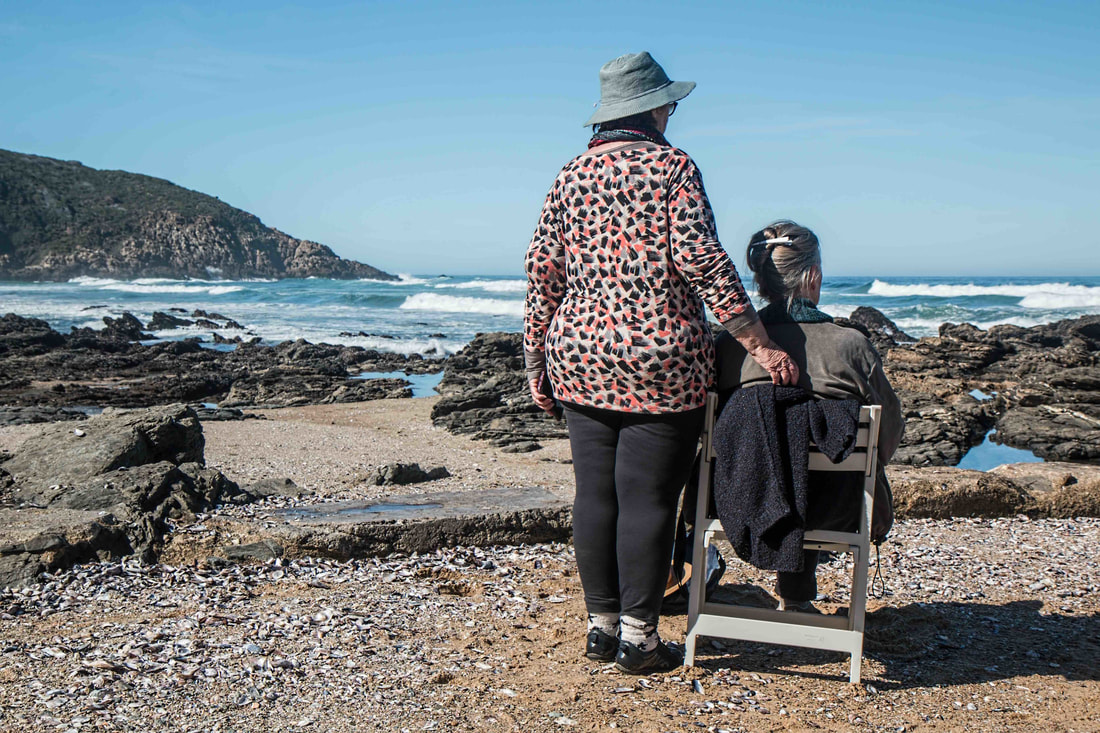|
For 15 years after my father died, my mother managed her finances without a hitch. She had been educated at a top woman’s college and continued to teach at Fairleigh Dickinson University in Teaneck until her late 70s – driving 100 miles round-trip up and down the Garden State Parkway, rain or shine or snow.
Then one day she confessed to me that she no longer felt comfortable handling money, paying bills or managing her investments. My initial reaction was one of disbelief. I’d never known a smarter, more capable person – woman or man. But after reviewing her checkbook and discovering a pile of late bills, I realized she was right. She asked me to contact the branch managers at two local banks where she had accounts, her investment advisor at TIAA, her attorney and the manager of her condominium building in Highlands. I found them all to be very forthcoming with information and advice. The reason for this only dawned upon me later: Years earlier, my mother had signed a power-of-attorney (POA) that authorized my sister and me to act on her behalf when she no longer was capable of managing her own affairs. The POA proved a godsend, allowing me to cut through red tape and quickly get a handle on my mother’s finances. In retrospect, I’m very thankful she had the foresight to establish power of attorney. But what, exactly, is a POA and how does it work? Are there any risks? How much does it cost? For answers, I turned to Dana A. Bennett, an attorney with offices in Red Bank and Lakewood. Bennett, who has degrees from Villanova, Seton Hall and New York University, has been practicing trust-and-estates law for more than 20 years. Her credentials include chair of the Monmouth County Probate Committee and past president of the Estate and Financial Planning Council of Central New Jersey. She lives in Marlboro with her husband and two daughters. Q: What does “power of attorney” mean? A: A Power of Attorney (POA) is a legal document in which the principal (i.e., the person executing the POA) appoints an agent to assist with the principal’s financial affairs. The POA can be drafted to be effective immediately or conditioned on the principal’s incapacity. The POA does not strip the principal of any power; it merely enables someone to help with financial matters if the principal so desires. The agent under a POA has a fiduciary duty to act in the principal’s best interest. Q: Who needs to consider setting up a POA? A: Everyone 18 years of age and older should consider setting up a POA. Q: What are the potential consequences of not having a POA? A: If a person becomes incapacitated and does not have a POA, then a family member or friend must file a court action seeking legal guardianship over the person in order to pay the incapacitated person’s bills and handle their finances. The cost of a typical guardianship proceeding is several thousand dollars. Spouses do not have an automatic right to access each other’s financial accounts. Q: What advice can you offer when it comes to choosing an individual to serve as a POA? A: The person you appoint as your agent under the POA should be someone you trust implicitly with your money. The agent should also be someone who is well organized and would have sufficient time to devote to your financial affairs. Q: Does a POA grant unlimited power to make decisions on behalf of an elderly person, including financial decisions? A: Most POAs are very broad and allow the agent to do anything financial-related on the principal’s behalf. However, it is possible to sign a “limited” POA. A limited POA, for example, might give the agent access to one particular bank account. Q: What steps are involved in setting up a “POA”? A: Since a POA is a legal document with serious implications, prudence dictates that you see an estate-planning attorney to prepare a POA. Q: How much does it cost to draft and finalize a POA? A: While attorney fees vary, the typical cost is $175-$250. Q: Once a POA is finalized, can it ever be amended? A: You can revoke or amend a POA at any time as long as you are deemed competent. If you make any changes, you should immediately notify the agent under the POA and any financial institution that may have been given a copy of the POA. For more information about setting up a POA, Bennett can be reached at 732-268-7520. Her website is www.bennettwyatt.com.
1 Comment
A few years before my mother passed away, she asked me to take over her finances. She had become increasingly forgetful and fuzzy with numbers, and she was afraid she might make a costly mistake. I was glad to help out. One of the first things I discovered was that my mother was very generous with her money. She frequently donated to a number of causes -- from political action committees supporting women candidates to animal-rights groups to law-enforcement organizations. When I asked her why she gave to certain groups, she answered, “Oh, they’re always calling for money.” That led to a conversation with an aide we had hired to help take care of my mother. The aide told me my mother often received calls from people asking for money -- in some cases from people who sounded suspicious. I could feel my blood start to boil. Ironically, even as the aide and I were discussing this out of earshot of my mother, the phone rang. My mother took the call. I listened from the other room as she answered a series of questions. After a while, my mother yelled to the aide to fetch her pocketbook. “Why do you need your pocketbook?” I asked. “He needs my credit card,” she said. “Who? For what?” “I’m not sure.” That was enough. I asked my mother if I could talk to the man and she handed me the phone. “Who is this?” I asked. The man mumbled something and asked me who I was. “I’m her son,” I said. Click. I never did find out who that was on the phone, what they wanted, or whether they represented a legitimate business or charity. My mother wasn’t sure either. But such incidents became increasingly common as my mother grew older and lost her edge mentally. Before I took over her finances, it wasn’t unusual for her to write a check to the same organization two or three times in a month. And she once received a large package from a company that sells expensive emergency-alert systems for the elderly. “Did you order this?” I asked her. “No, I don’t think so,” she answered. After many hours on the phone, I finally got the company to take back the equipment. But they refused to refund more than $500 that had been billed to my mother’s Visa card. My mother was fortunate. The amounts of money she misspent or misplaced were relatively small. Many other elderly women and men aren’t nearly so lucky. The Daily Item, a Massachusetts newspaper, recently published an excellent series on elder abuse, including financial abuse, that detailed a number of horrifying cases. One involved a retired reverend who took a call from a man identifying himself as a San Diego police officer. The reverend, 78, was told his grandson was being held in jail and that it would take $43,000 in cash to get him out. The loving grandfather mailed the cash -- only to discover later that it had been a hoax. Another case involved an 85-year-old woman who became friendly with a worker at a local senior-services agency. Over time, the agency employee persuaded the elderly woman to change her will, naming her as a beneficiary. She also helped the woman take out a home equity loan, then pocketed the proceeds. “Elder victims of financial exploitation have lost homes, pensions, life savings, had utilities shut off, and suffered other financial hardships,” the newspaper report says. According to Consumer Union, publisher of Consumer Reports, some 500,000 elderly Americans lose up to $36 billion annually due to financial abuse. Among the most popular scams, according to the National Adult Protective Services Association, are callers who say you’ve won a sweepstakes but first must send money to cover taxes; home-repair cons in which a scammer promises to do work cheaply, then disappears with your money; fraudulent fund raisers who solicit donations for ostensibly good causes; and individuals posing as utility workers who knock on your door looking to steal items from your home. The protective-services association repeatedly reminds senior citizens that as a matter of policy, lottery agents, police and the IRS never call to ask anyone for cash. The association urges people not to give out information to strangers -- particularly bank account, credit card, and Social Security numbers. The best way to prevent financial abuse of the elderly is for their children or other relatives to get involved. The newspaper series on elder abuse recommends family members take the following steps:
John Wasik, a personal-finance columnist for Forbes magazine, has written frequently on the topic of financial abuse of the elderly. “The best weapon in the fight against elder financial abuse is vigilance,” he wrote in a recent column. “Have a family meeting ... to discuss how to best protect a loved one.” Wasik recommends talking to older adults about assigning power of attorney to younger family members before it’s too late. “At a certain age, your older relatives will be unable to do things like pay bills or monitor their investments,” Wasik says. “It’s a natural consequence of age and cognitive decline -- and they may be suffering from dementia. I recommend that more than one person in a family be granted power of attorney.” What exactly is power of attorney? How does one establish it, and how much does it cost? In my next blog, I’ll put these and other questions about power of attorney, or POA, to Dana Bennett, a Red Bank attorney who specializes in estates-and-trusts law. Written by T.J. Foderaro
A recent study by the giant accounting firm PwC looked at elder-care insurance claims in an effort to gauge the enormous cost of long-term care (LTC). Bottom line: The average lifetime cost is $172,000. For the top quartile of policyholders who spent the most on long-term care, the average was $240,000 – nearly a quarter of a million dollars. (See previous blog post for more on the sky-high cost of elder care.)
It’s no wonder rates for long-term-care insurance have risen sharply in recent years. Does an LTC policy make sense for you or a loved-one? Do the upfront costs justify the potential benefits? To get answers, I contacted Toby Stark, president of Stark Associates, an insurance agency in Tinton Falls. Stark has been in the insurance business for nine years, offering a range of coverages including LTC. Stark graciously agreed to answer my questions about LTC insurance: Q: What kinds of services are covered by long-term care (LTC) insurance? A: Services include assistance with your activities of daily living (ADL) at home. Typically, an aide will visit your home (2-3 hours per visit) to help with dressing, bathing, preparing meals and similar household chores. Alternatively, insurance will cover a semi-private room in a facility. Q: There have been news reports that the cost of LTC insurance has risen dramatically in recent years. Why is that? A: The reports are accurate. Many carriers have left the market. Originally, rates were very competitive. As with any insurance policy, when utilization increases, the insurance carrier must increase the cost to either the current or new policy owners, leading to more expensive plans. Meanwhile, the cost of care has increased very rapidly, resulting in coverage that could be out of reach for the consumer. Home healthcare today, full time, could cost $75,000 per year. A semi-private room could cost up to $325,000 per year. Q: What are the main factors insurers consider in pricing long-term care policies? A: If you are looking to enroll in a traditional LTC policy, your current health plays a big part in being covered. Also, the carrier will make sure your mind is sharp and there are no signs of dementia. Even after that, only about 50 percent of those who apply actually get a policy. Life insurance with an LTC rider has more liberal underwriting. Q: Are there flexible policies that cover one or both spouses in a household? A: Generally, the policies are flexible. They are built for a couple to enroll, and offer as much as a 40% discount if both enroll together. Q: Roughly how much might a 60-year-old woman in reasonably good health expect to pay for LTC insurance? How about an 80-year-old? A: Depending on the individual, a 60-year-old could expect to pay $3,000 to $4,000 a year. An 80-year-old could expect to pay $12,000 a year or more. Q: What can be done to keep costs down? A: There are ways to keep costs down. I tell my clients only purchase what you can afford. Do not buy a policy that covers all your cost of care. Take out a policy that covers a good amount of your LTC bill, but not all of it. Q: Are there policies that offer fixed premiums similar to term-life insurance? Or do the premiums increase every year? A: Traditional LTC policies can change to increase costs if the carrier decides to do so. Life insurance with an LTC rider would be a fixed cost with no fluctuation. Q: At what age would you recommend people consider purchasing long-term care insurance? A: Ideally, the purchaser should be 55-62 years of age. Family history is a powerful tool, but there is no such thing as “family future.” If you have money and assets and would like to protect them, the smart choice is to buy coverage in that age range. Don’t wait until it is unaffordable and you are uninsurable. If not protected, you can kiss good-bye any savings you had. For more information, Stark can be reached through his company’s website at http://www.stark-associates.com/. Written by T.J. Foderaro When an elderly loved-one no longer is independent enough to live alone, deciding the best course of action can be very stressful. And unless family members are available to provide the necessary support, the most stressful part often is discovering the astronomical cost of long-term care. A number of recent studies and surveys make this painfully clear. Just last month, the big accounting firm PwC (formerly known as PricewaterhouseCoopers) published a comprehensive report based on insurance claims for long-term elderly care submitted to eight major insurers by a total of 270,000 policyholders. “Based on our research, we estimate that the current average lifetime cost for long-term care is $172,000,” according to the report. And that’s just the average. Among the top quartile – some 67,500 policyholders who spent the most money on care – the average was $240,000. The PwC report included two other sobering statistics:
Another study, by one of the biggest players in the elder-care insurance field, Genworth, found that the cost of a semi-private room in a nursing home rose 4.4% from 2016 to 2017 to $7,148 per month. And for a private room, the cost jumped 5.5% to $8,121 per month. And that’s the national average. In New Jersey, the cost of long-term care is higher across the board. A recent survey by Caring.com ranked states by the affordability of elder care. New Jersey placed near last, in 48th place, sandwiched between Hawaii and Rhode Island. Most nursing homes in New Jersey charge $100,000 or more for a private room. Of course a nursing home isn’t the only option available to elderly residents who need assistance with everyday tasks such as cooking, cleaning, laundry and hygiene. A growing number of home-care agencies offer services ranging from hourly visits by so-called home companions to round-the-clock assistance from certified home health aides. While less of a financial burden than a nursing home, such services still are far more expensive than many people realize. Twin Lights Home Care, which specializes in placing experienced, compassionate live-in aides at affordable rates, recently conducted an informal survey of home-care agencies serving the Monmouth County area. Rates for hourly care start at around $20 per hour, for a minimum of 20-25 hours per week. If a client needs fewer hours per week, the rate typically goes up to $22-$24 per hour. On weekends, rates run as high as $27 per hour. Do the math: An elderly man or woman requiring six hours of help each day could expect to pay about $1,000 per week – more than $50,000 a year. For seniors requiring more than a few hours a day, it may make sense to hire a live-in aide. Our survey found live-in daily rates ranging from $183 per day to $250 per day – for an average of about $220 per day. Many agencies tack on additional fees if an aide has to attend to a client at night, or the client has a pet. (Unlike the agencies we surveyed, Twin Lights is not a franchise. Our rate for a live-in aide is $175 per day, with no additional or hidden costs.) Even at the low end of the range, the cost for home-based care can be financially stressful, if not prohibitive, for many people. That’s why financial advisors and estate planners often recommend their clients consider buying long-term care insurance, so the costs don’t eat up their life savings. But, of course, such insurance policies also carry a cost – an increasingly high one, it turns out. Because insurance companies originally priced the policies too low, many of the biggest carriers, including Genworth, have suffered heavy financial losses. As a result, premiums for long-term care insurance have risen sharply in the past few years. Does long-term care insurance make sense for you? That will be the subject of my next blog, when I invite Toby Stark, president of the Stark Associates insurance agency of Tinton Falls, to answer important questions about the pros and cons of long-term care.
|
AuthorT.J. Foderaro Archives
February 2020
Categories
All
|
Copyright © 2023, Twin Lights Home Care, All RIghts Reserved




 RSS Feed
RSS Feed
